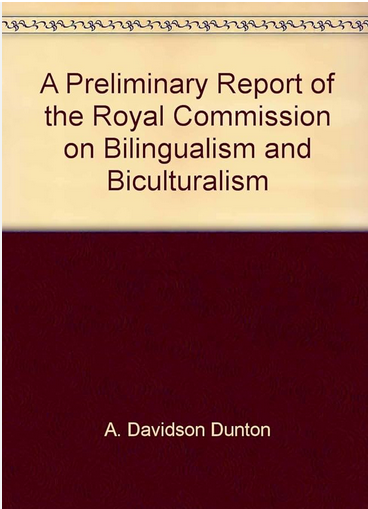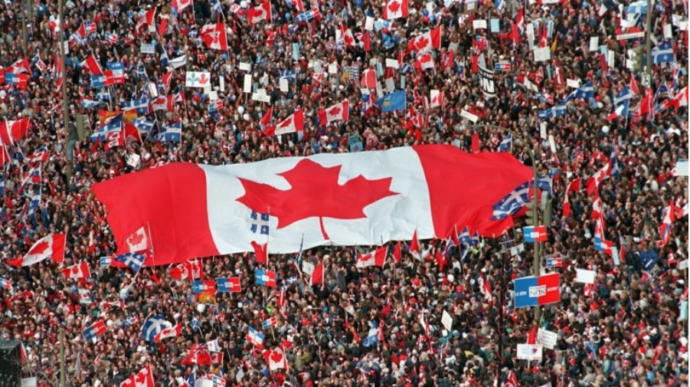April 2nd, 2025
BURLINGTON, ON
Donald Trump has never heard of a Royal Commission. In Canada Royal Commissions have in the past changed the direction the country has taken and brought about significant changes n our culture. The recommended Royal Commission could very well change our relationship with Americxa and in the process change the United States.
A Brock expert, together with colleagues from other Canadian universities, is calling upon the federal government to convene a royal commission on securing Canada’s future.
Alongside Jörg Broschek, Érick Duchesne and Patrick Leblond, Brock University Associate Professor of Political Science Blayne Haggart penned an open letter, available in English and French and also published by Policy Options, outlining the argument in favour of a royal commission.
Haggart says that although royal commissions may seem old-fashioned — the last one was the Royal Commission on Aboriginal Peoples, established in 1991 — they have proven effective at mapping out complex issues and informing a path forward.
1963 Prime Minister Lester B.Pearson established the Royal Commission on Bilingualism and Biculturalism. That Commission report, known as the Laurendeau-Dunton Commission, led to the recognition of English and French as Canada’s official languages.
The Glassco Royal Commission on Government Organization, appointed in 1960 to inquire into the organization of the Government of Canada. Chaired by businessman J. Grant Glassco, it issued a five volume report in 1962 and 1963 recommending that government departments be managed on a decentralized basis, that the Treasury Board be reorganized, and that senior management should rotate between departments.
Tha Royal Commission also recommended that the Dominion Bureau of Statistics should become an independent department whose independence should formally be recognized. In January 1965, this led to an Order in Council, which designated the Bureau Department of the federal government.
“Royal commissions not only set out recommendations that the government should act on, but they also set out a way of thinking about things based on voices from across the country,” says Haggart. “A royal commission is a way we can think publicly about these things and build consensus.”
In the letter, the authors outline how drastically the world has changed over the past 20 years and say that Canadians are long overdue for some dedicated thinking and action around security.
According to Haggart, some key concerns are reducing economic dependence on the United States and reducing security vulnerabilities within the military, while also continuing to co-operate with the U.S., when necessary.
He also says the threat to Canadian sovereignty has created a moment for Canada to commit more fully to respecting the sovereignty of Indigenous nations and finding ways to work together.
 “It is vitally important that our current moment of patriotism and nationalism be used positively,” says Haggart. “Our Canadian sovereignty is under attack by the United States, and it’s at risk, which tells us that sovereignty is important, something we should respect, especially in our treaty obligations with First Nations, Inuit and Métis peoples.”
“It is vitally important that our current moment of patriotism and nationalism be used positively,” says Haggart. “Our Canadian sovereignty is under attack by the United States, and it’s at risk, which tells us that sovereignty is important, something we should respect, especially in our treaty obligations with First Nations, Inuit and Métis peoples.”
Haggart points to recent calls to resurrect plans for constructing a national oil pipeline as an example of how reactive thinking and decision-making that fails to involve multiple perspectives or consider new options will not serve the current moment.
“Building a cross-country pipeline is a project that has been on the back burner for the past several decades,” he says. “But it’s not 2009 anymore. We’re in a climate emergency. There are other energy technologies out there. Things have changed, and a pipeline is only one possible way we could address our current problems. Simply dusting off existing projects won’t be enough to get us through.”
He also says the groundswell of popular support for Canadian businesses in the last two months shows that citizens are ready to consider new approaches.
“The ideas people are open to today — of creating a more self-contained, resilient Canadian economy and making the military more independent — have been largely ignored or downplayed for the past 40 years, during which we focused on free trade and integration with the United States,” says Haggart. “There is a visceral sense that we have to change things, but unless we work through exactly what that means in the public eye, the temptation of the status quo will continue.”
Haggart is also concerned that the big picture is not yet playing a major part in the federal election campaign.
“We can’t tax-cut our way out of the problem that we’re in — we need new thinking,” he says. “If we make decisions moment to moment, we could end up sleepwalking in a direction that we don’t want to go. At some point, the government has a responsibility to take the time, do the work and figure out what we want to do as a country.”
The letter:
Open Letter to the Next Prime Minister of Canada: Call for a Royal Commission on Securing Canada’s Future
There is no longer any room for doubt. Donald Trump’s return to the U.S. presidency is a seismic shift for the entire world.
However, the liberal international order that Trump threatens and that benefited Canada so greatly for so long has been unraveling for more than two decades.
As a result, Canadian policies and mindsets rooted in the late 20th century are hopelessly outdated. The time for complacency is over. Canada must wake up, adapt and steel itself for the harsh realities of today.
In short, we need a royal commission on securing Canada’s future.
The world in which Canada operates has fundamentally changed in the last 20 years. It began with the 9/11 terrorist attacks.
Afterward, security trumped trade in the U.S. New and enhanced security measures led to a “thicker” border. More rules, regulations, paperwork and scrutiny caused delays and increased costs. Canada-U.S. trade suffered as a result.
This shift further illustrated the risks of Canada’s deep economic dependence on its southern neighbour, but our reaction was to work even more closely with the U.S. to keep the border open to trade.
Since then, the escalating climate crisis, the rapid digital transformation, the global financial crisis, China’s economic and political rise, Russia’s authoritarian resurgence and U.S. fears of hegemonic decline have only intensified America’s focus on national security as a defining feature of its economic relations, pushing other countries to do he same.
The policies and governance mechanisms that underpin Canada’s society, economy and security were not designed for the current illiberal international landscape.
After the Second World War, Canada sought greater integration with the U.S. – a trend that was cemented by the free trade decisions of the 1980s and 1990s. At the same time, Canada also joined the U.S. in promoting an open, rules-based, multilateral global order.
Canadians assumed, with good reason, that the U.S. would continue to respect and support such a system because it benefited from it economically and militarily. Globalization, democratization and unipolarity following the end of the Cold War formed the basis of the “peace dividend.”
Canada thrived within a system we took for granted, failing to question whether its foundations could shift. Even as the world changed around us, complacency set in – as if global upheavals and U.S. policy shifts were distant concerns. This mindset weakened our influence, eroded our global role and stifled productivity growth long before the current crisis exposed the true cost of our inaction.
No previous crisis has so starkly exposed Canada’s existential challenges as the Trump 2.0 shock. Trump’s return has shattered our illusions, forcing Canadians to confront the world as it truly is. From newspaper editorials to the national anthem echoing in hockey arenas, a new awareness has taken hold. Canadians now recognize that our country faces its greatest challenge in decades.
In the past few months, Canadians have shown unwavering resolve in the face of Trump’s unprovoked threats to our independence. We have made it clear that Canada is worth fighting for. Elbows up.
Every crisis calls for two types of action: containing the imminent threat and addressing its root causes.
Canadian governments have handled short-term crises relatively well. Just look at the success of the Team Canada response during Trump 1.0.
But crisis management is not enough. We must rally Canadians in an all-hands-on-deck effort to forge a bold new socioeconomic model – one that doesn’t just help us survive turbulent times but positions us to emerge stronger than ever.
This requires new thinking. To build the future, we must first imagine it.
Canada might actually end up with a pair of cajones.



















